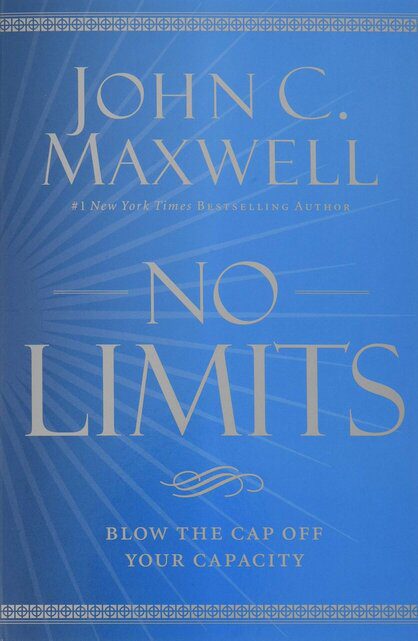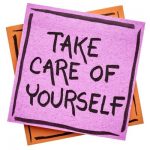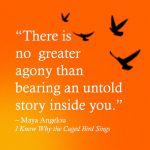Print | Kindle (eBook) | Audiobook
Many of us set limitations on our capacity, we set limits on what is possible in our lives. New York Times bestselling author John C. Maxwell, identified 17 capacities that we all possess and he also provides actionable advice on how to increase our potential in each. The Core theme of No Limit: If you are aware of yourself and your ability to improve, if you develop the abilities you already possess, and if you make the everyday choices that help you improve, you will reach your capacity.
John Maxwell Identified 7 capacities and 10 choices we can develop, grow and harness to blow the CAP off our limitations. Everyone has capacities that are based on their natural talents. Some of them require very specific abilities, such as those found in symphony musicians, professional athletes, and great artists.
The Seven Capacities
Energy Capacity—Your Ability to Push On Physically
Emotional Capacity—Your Ability to Manage Your Emotions
Thinking Capacity—Your Ability to Think Effectively
People Capacity—Your Ability to Build Relationships
Creative Capacity—Your Ability to See Options and Find Answers
Production Capacity—Your Ability to Accomplish Results
Leadership Capacity—Your Ability to Lift and Lead Others
Increased capacity comes from making the right choices.
The Ten Choices:
Responsibility Capacity—Your Choice to Take Charge of Your Life
Character Capacity—Your Choices Based on Good Values
Abundance Capacity—Your Choice to Believe There Is More Than Enough
Discipline Capacity—Your Choice to Focus Now and Follow Through
Intentionality Capacity—Your Choice to Deliberately Pursue Significance
Attitude Capacity—Your Choice to Be Positive Regardless of Circumstances
Risk Capacity—Your Choice to Get Out of Your Comfort Zone
Spiritual Capacity—Your Choice to Strengthen Your Faith
Growth Capacity—Your Choice to Focus on How Far You Can Go
Partnership Capacity—Your Choice to Collaborate with Others
The Capacity Challenge
If you grow in your awareness, develop your abilities, and make the right choices, you can reach your capacity. Awareness is something we learn. Ability is a gift that we already possess. Choices add to both the things we learn and the gifts we possess.
“AWARENESS + ABILITY + CHOICES = CAPACITY”
Who we are determines how we see ourselves. We naturally tend to see things as we have always seen them. If we want to increase our capacity, we must see differently. We need to be willing to look at ourselves and our world in new ways. We need to pay attention and look for what we need to know.
“Successful people desire excellence. Excellence comes from focusing on your strengths. Whatever you do well, try to do better. That’s your greatest pathway forward to increased capacity.”
Domestication of our Capacity
When an elephant was very young and weighed only several hundred pounds, it was restricted by having a chain clasped to its leg and connected to a tree or deep stake. When the animal tried to move away and learned that it could not break the chain, it limited itself. It believed that whatever restriction was put on it—even a rope it could have easily broken—was more powerful than it was.
People are like those elephants. We often believe that some of the restrictions we may have experienced earlier in life are permanent. Or we’ve been told we have limitations that we actually don’t possess, and these things are keeping us from taking the journey in life that we long for. These are the chains we need to break.
“Awareness changes everything. As soon as we become aware that some of our “limitations” are artificial limitations, we can begin to overcome many of them. We can blow off these caps, which opens the way for growth.”
Catherine B. Ahles, public relations professor and vice president for college relations at Macomb Community College, observes
“We spend most of our twenties discovering all of the hundreds of things we can be. But as we mature into our thirties, we begin to discover all of the things we will never be. The challenge for us as we reach our forties and beyond is to put it all together—to know our capabilities and recognize our limitations—and become the best we can be.”
“Part of the process of fulfilling your purpose is becoming aware of the things you can’t change that limit you, so that you can direct your attention toward the things you can maximize to increase your capacity.”
Energy Capacity—Your Ability to Push On Physically
The ultimate measure of our lives is not how much time we spend on the planet, but rather how much energy we invest in the time that we have. The premise of this book—and of the training we do each year with thousands of clients—is simple enough: Performance, health, and happiness are grounded in the skillful management of energy.… The number of hours in a day is fixed, but the quantity and quality of energy available to us is not. It is our most precious resource. The more we take responsibility for the energy we bring to the world, the more empowered and productive we become.
The easiest thing to be in the world is you. The most difficult thing to be is what other people want you to be. Don’t let them put you in that position. – Leo Buscaglia
Emotional Capacity—Your Ability to Manage Your Emotions
• Most people do not see themselves as they really are.
• Many people don’t want to resolve their problems; they just want someone to listen to them talk.
• Some people are not emotionally strong, and as a result, they do not cope well with life’s difficulties.
Growth requires your thoughts to be continually upgraded.
The difference between average thinkers and good thinkers is like the difference between ice cubes and icebergs. Ice cubes are small and short-lived. Icebergs are huge, and there is much more to them than meets the eye. Their capacity is enormous.
Three-E formula for creativity:
Exposure of an idea to the right people + Expression from their different perspectives = Expansion of that idea beyond my personal ability.
“The tragedy of life is often not in our failure, but rather in our complacency; not in our doing too much, but rather in our doing too little; not in our living above our ability, but rather in our living below our capacities.” – Benjamin E. Mays
Historian, Reporter, or futurist
We have three options in life. We can be historians, reporters, or futurists. The historian wants to remind us of everything in the past and wants to filter everything in the future through that. The reporter is really attached to conditions and circumstances today, and that’s just the way it is. The futurist focuses on what hasn’t yet been done. He says, ‘There is more for us to do. We can do more. We can broaden our capacity. There is more of our potential we can take advantage of.
Tempted by Scarcity Thinking
In general, scarcity lives on the other side of “no,” meaning people stay where it’s safe, while abundance lives on the other side of “yes,” meaning they’ll try something new. What does it look like to live on the other side of no?
• It’s limiting—because it directs you away from new opportunities.
• It’s easy—because when you say no, you don’t have to do anything or go anywhere.
• It’s comforting—because it feels familiar. Many people are more fearful of losing the little they do have than they are excited about gaining something they don’t have.
• It’s deceiving—because it appears to be safer, but it’s not. As author Steven Pressfield says, “It’s one thing to lie to ourselves. It’s another thing to believe it.
• It’s crowded—because that’s where average people live.
All the Best in your quest to get Better. Don’t Settle: Live with Passion.



1 Comment
Pingback: John C. Maxwell on Leadership. – Lanre Dahunsi